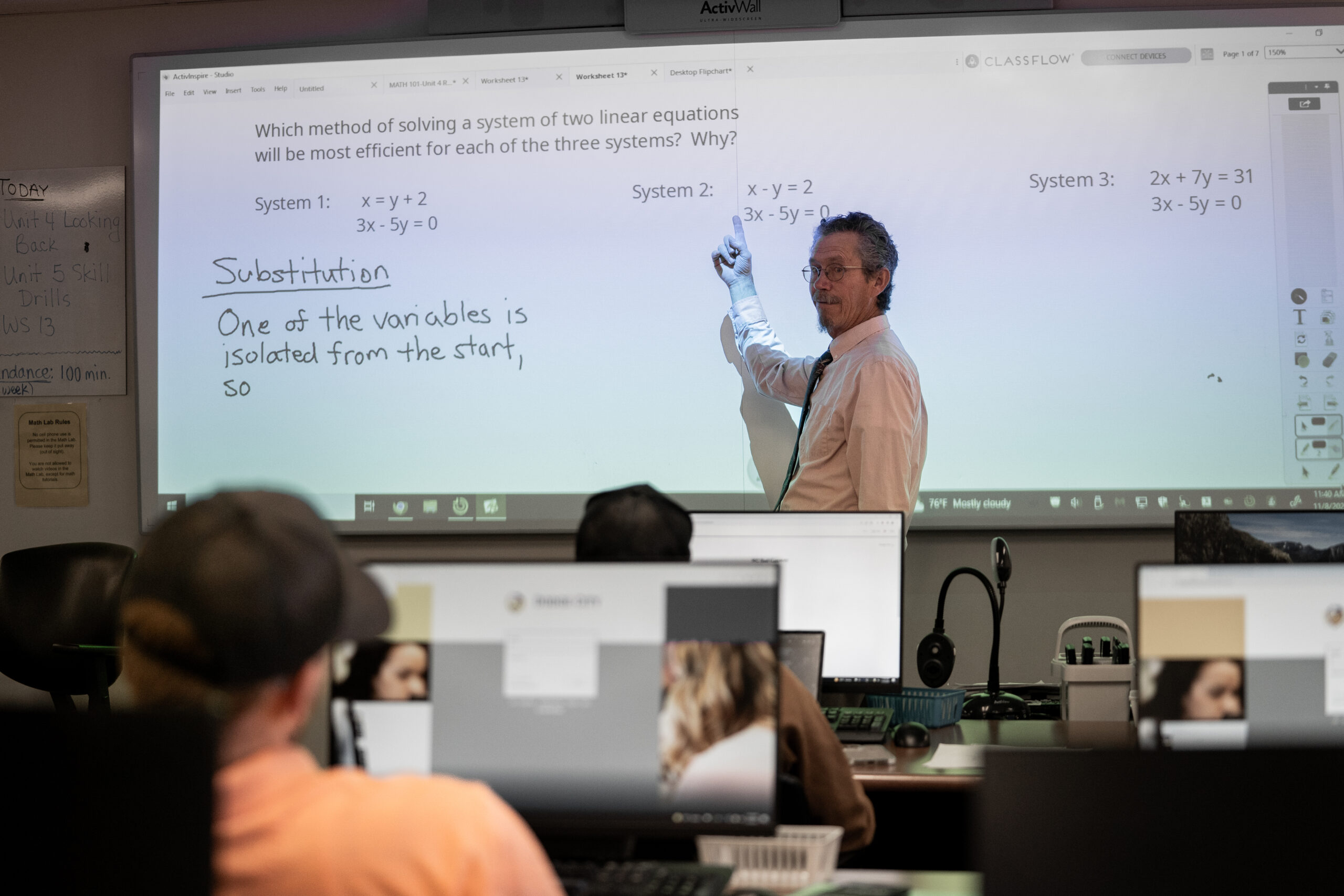DC3 Begins New Mathematics Program
Published November 8, 2023

This fall, DC3 is piloting a new sequence of mathematics courses that places students in credit-bearing classes their first semester. Above, Russel Rickers, Math Lab Coordinator, works with students in the college’s Math Lab on Wednesday, Nov. 8. [Photo by Lakin Scheck]
This fall, Dodge City Community College (DC3) responded to a Kansas Board of Regents (KBOR) initiative by piloting a sequence of mathematics courses that places students in credit-bearing classes their first semester. In addition, this new program provides additional learning support with lab courses and tutoring opportunities.
Dr. Jane Holwerda, DC3 Vice President of Academic Affairs, said the pilot program eliminates developmental courses that traditionally do not count toward graduation or transfer credits.
DC3’s revamped math sequence involves two courses: Modern College Math (MATH 101) and College Algebra (MATH 106), which were both established for students transferring to KBOR colleges and universities.
Since DC3 recently has implemented online enrollment, Math Professor Stephanie Gruver, who also chairs the Math-Science Division, said students can make informed math course choices during that process by filling out an online survey.
“We developed a guided self-placement survey, which is accessed through the college’s website,” Gruver said. “Based on responses to questions about students’ degree plans, programs of study, and history of previous math courses, the survey recommends whether College Algebra or Modern College Math will be their better option.”
Additionally, students now have the opportunity to enroll in a learning support lab through Nov. 13, in either the Math Lab, the Student Achievement and Resources Center (SARC), or TRIO.
Russel Rickers, DC3 Math Lab Coordinator, said the support courses use multiple approaches to work toward student learning and success.
“First, we help students fill in gaps in their prerequisite math skills by using a pretest to identify those fundamental skills students lack and then giving them customized problem sets tailored to promote mastery of those skills. These are not typically covered in the parent course,” he said. “Second, students are able to work on the homework assignments from the parent course, and get immediate help when they need it.”
And when needed, Rickers said students also can receive supplemental instruction on objectives of the parent course.
“The worksheets we assign weekly have four or five problems similar to the problems students will see on their exams, bridging the gap between the support course and the parent course,” he said. “In the days prior to the parent course exam date, we also host several review sessions to help students be well-prepared for success.”
In the support course, Rickers said students can do four things. The first is a skill drill, which is one customized math assignment per unit that contains problems designed to help students master the prerequisite skills they need to succeed in the parent course.
The second is doing homework questions and answers, which is where students work on their parent course homework assignments, either individually or together.
The third is doing worksheets, which are weekly assignments with problems similar to the unit exam. Through these worksheets, students become familiar with the format of the exam, plus learn the math skills necessary to complete the parent course assignments.
And lastly, students can do weekly Achieving Success presentations, which are designed to motivate them to think about various topics related to student success, such as dealing with test-taking anxiety, note-taking, and growth mindset.
Rickers said the success of the support course, as with other classes, depends on a student’s willingness to attend the scheduled class sessions and to participate in the activities involved.
“All assignments for the support course are designed such that students should be able to complete them during the scheduled class times,” he said. “So there is no ‘homework’ that requires a further time commitment.”
Holwerda said the process of redesigning the math curriculum has opened opportunities for communication and team building throughout the DC3 campus. And faculty, staff, and administration continue to assess student success rates, as they prepare for spring 2024 enrollment.
“A great example is the alignment of goals of DC3’s academics to promote students’ accountability for learning — encouraging them to partner with faculty, to use learning supports like placement surveys, learning labs, and tutoring — with the goals of DC3’s Advising Center to foster student resilience, grit, and self-regulation.”
For questions about DC3 math courses and curriculum, students and staff may contact conqueringmath@dc3.edu or advising@dc3.edu.
By Lance Ziesch
DC3 Assistant Director of Marketing and Community Relations